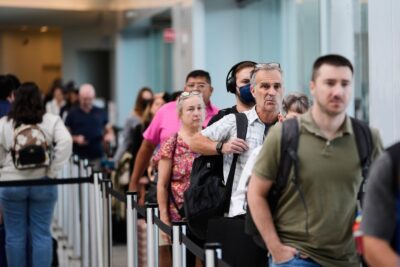U.S. to take photos of all travellers entering or leaving the country
By Canadian Press on October 27, 2025.

WASHINGTON — The U.S. Department of Homeland Security is amending its policies to require that all non-citizens — including Canadians — be photographed when entering or leaving the United States.
The new security regulations, posted in the federal register Monday, are set to come into force on Dec. 26, although it could take years to fully implement them.
The department is looking to build a comprehensive biometric data collection through the new policy. It says it will use facial recognition technology to match a traveller’s photo with existing passenger information on file with the U.S. government.
The records could be held for up to 75 years.
“In select cases, fingerprints may also need to be collected, but only as required to better establish links to previously collected traveller biometric records,” the department said.
The posting in the federal register said the change is necessary to fight terrorism and the use of fraudulent documents, and to ensure people are not overstaying their visas.
“Ultimately, this provides DHS with more reliable information to verify identities and to strengthen its ability to identify criminals and known or suspected terrorists,” it said.
The department said U.S. Customs and Border Protection has been collecting biometric data from some travellers since 2004.
People passing through American airports are likely to have been photographed throughout the check-in process. The rule changes will expand that effort with a more comprehensive system to track travellers leaving the U.S.
The department said it’s still facing technological challenges as it moves to deploy the new policy at land border crossings.
The Canadian Civil Liberties Association expressed alarm over the policy change and called facial recognition flawed and intrusive.
“This dramatic expansion of intrusive facial recognition capabilities is all the more troubling for its lack of accompanying privacy safeguards,” said CCLA executive director Howard Sapers in a news release.
“Biometric information is deeply sensitive and requires the highest level of protection, including rigorous security safeguards and effective privacy remedies.”
The association said facial recognition technology is highly prone to error and subjects racialized, non-white people to higher rates of false positives.
Tamir Israel, director of the association’s privacy, surveillance and technology program, said “mass deployment of this technology — which is simply not yet fit for purpose — is reckless.”
The Department of Homeland Security is also ending a rule that exempted travellers under the age of 14 and over the age of 79 from the collection of biometric information — a rule the department said was in place due to “technological limitations.”
The department said the exemption was lifted to allow “DHS to associate the immigration records created for children to their adult records later, which will help combat the trafficking of children, and screen for criminal history or associations with terrorist or other organizations seeking to violate applicable law throughout a person’s lifetime.”
A near-identical change was proposed in 2021. Many members of the public submitted comments at that time voicing opposition to the changes due to privacy concerns.
The department is collecting public comments about the latest policy change until Nov. 26.
This report by The Canadian Press was first published Oct. 27, 2025.
Kelly Geraldine Malone, The Canadian Press
24-23

